Introduction: Elderly loneliness is more than just a fleeting emotion. For many seniors, it’s a daily reality. However, quality elder care and companionship can enrich, revitalize, and transform lives. This article sheds light on the profound impact of companionship in elder care.
Understanding the Depths of Loneliness: A staggering number of elderly individuals face loneliness daily. According to the World Health Organization (WHO), as many as 1 in 3 older adults today report feeling lonely, including in the United States.1 And social isolation now impacts 25% of Americans age 65 and older.2 Some of this is due to COVID.
The Physical and Psychological Effects of Loneliness:
- Mental Health: Loneliness has been linked to depression, anxiety, and cognitive decline.
- Physical Health: Studies, such as those published in news-medical.net, The researchers found that both social isolation and loneliness increased the risk of hospitalization or death from heart failure by 15% to 20%. However, they also found that social isolation was only a risk factor when loneliness was not also present. 3
Real Stories: Companionship in Action Jane, an 82-year-old retiree, shares, “After my husband passed, the days were long. But when my caregiver, Lisa, started visiting, everything changed. We laugh, we bake, and I’ve started painting again.”
The Science Behind Companionship: It’s not just anecdotal evidence that emphasizes the importance of companionship. Research, such as a systematic review from the National Library of Medicine, highlights that strong social relationships are linked to a lower risk of cognitive decline, underscoring the significance of consistent social interactions for emotional and cognitive well-being.4
Conclusion: The Power of Together The golden years should be filled with warmth, laughter, and connection. By integrating companionship into elder care, we’re not just combating loneliness; we’re enriching lives. The mantra is simple: In companionship, there’s healing, hope, and a horizon full of possibilities.

